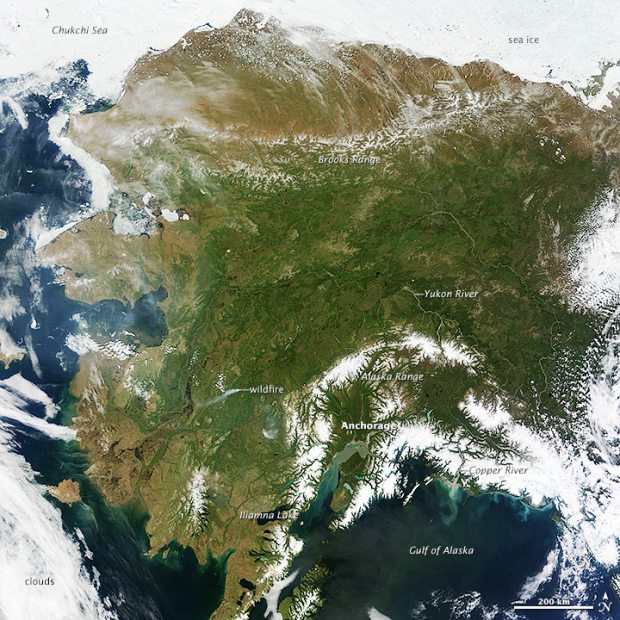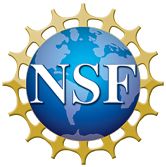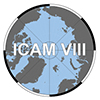|
|
|
|
|
|
|
|
No Arctic science event is on today's agenda.
|
Media
Rapid Changes in the High Arctic. A new study led by an INSTAAR postdoctoral researcher has found dramatic shifts in the ecosystem of a remote archipelago in the Arctic Ocean in response to recent climate change. Published today in the open-access journal Scientific Reports, the study finds explicit links between changes in biological systems and climate change in the Arctic. In line with other studies, it shows that the high Arctic, which is warming faster than any other region on Earth, is already undergoing rapid ecosystem change and will continue to transform in the future. Phys.org
 Shock and Thaw-Alaskan Sea Ice Just Took a Steep, Unprecedented Dive. Shock and Thaw-Alaskan Sea Ice Just Took a Steep, Unprecedented Dive. April should be prime walrus hunting season for the native villages that dot Alaska's remote western coast. In years past the winter sea ice where the animals rest would still be abundant, providing prime targets for subsistence hunters. But this year sea-ice coverage as of late April was more like what would be expected for mid-June, well into the melt season. These conditions are the continuation of a winter-long scarcity of sea ice in the Bering Sea-a decline so stark it has stunned researchers who have spent years watching Arctic sea ice dwindle due to climate change. Scientific American
Phytoplankton Assemblages in Coastal Waters Remain Productive, Despite Variable Environmental Conditions. They form the basis of the Arctic food web -- and are extremely tough: even when the water becomes more acidic and the available light or temperatures change, various phytoplankton assemblages in the Arctic demonstrate undiminished productivity and biodiversity. This was the main finding presented in a study by researchers at the Alfred Wegener Institute, which they jointly release with their Canadian colleagues advanced online in the journal Nature Climate Change. Science Daily
Investing in Spill Response and Containment. The low oil price has intensified the industry's focus on improving oil recovery and reducing costs, but while these initiatives have been in the spotlight, somewhat in the shadows is a vital body of work that is advancing technology to improve operations by mitigating risk. Over the past eight years, there has been considerable investment in spill response and containment technology development that has brought about significant advances. Out of these initiatives have emerged some noteworthy new products and some very interesting R&D efforts that are aimed at managing unplanned hydrocarbon discharges in new and exciting ways. Oil and Gas Investor
Snow in the Andes as Clean as Canadian Arctic: Study. Snow covering the Andes mountains is as clean as the Canadian Arctic, scientists said Friday after hundreds of tests to determine the presence of black carbon deposits or other pollutants. Following extensive tests along the vast mountain range, which stretches about 7,000 kilometers (4,300 miles) along the western coast of Latin America, experts said they found less than 14 nanograms of soot per gram of snow. Phys.org
Arctic Social Science...a new assessment, funded by NSF, of the goals, potentials and needs in the context of a rapidly changing Arctic. A final report has been released (see here) on the Arctic Horizons' process, which was a series of six social science community workshops that took place in 2016-2017 across the U.S. to examine the state of Arctic social science research and to "assemble the diversity, needs, and priorities of the Arctic social sciences and its related disciplines and research approaches." Key recommendations include: promote, support, and enact Indigenous scholarship; promote the information sovereignty of Arctic Indigenous communities in research; pursue international and interdisciplinary research; mentor the next generation of northern scholars and promote equity in research; address rapid loss of cultural heritage, language and prehistory; and invest in data management. Learn more about this inclusive process at the Arctic Horizon website http://www.arctichorizons.org. potentials and needs in the context of a rapidly changing Arctic. A final report has been released (see here) on the Arctic Horizons' process, which was a series of six social science community workshops that took place in 2016-2017 across the U.S. to examine the state of Arctic social science research and to "assemble the diversity, needs, and priorities of the Arctic social sciences and its related disciplines and research approaches." Key recommendations include: promote, support, and enact Indigenous scholarship; promote the information sovereignty of Arctic Indigenous communities in research; pursue international and interdisciplinary research; mentor the next generation of northern scholars and promote equity in research; address rapid loss of cultural heritage, language and prehistory; and invest in data management. Learn more about this inclusive process at the Arctic Horizon website http://www.arctichorizons.org.
|
|
Future Events
The Arctic of the Future: Strategic Pursuit or Great Power Miscalculation? May 8, 2018 (Washington, DC USA). The Center for Strategic & International Studies will host this half-day discussion on the geostrategic and geo-economic future of the Arctic. In a moderated "exit interview," the Commandant of the U.S. Coast Guard, Admiral Paul F. Zukunft, will discuss his active public advocacy for and interagency pursuit of securing greater U.S. capabilities and readiness for a rapidly changing Arctic, as well as offer some thoughts on the overall trajectory of the Coast Guard's future mission in the polar regions. Subsequent panels will closely examine Russia's future economic and security ambitions in the Arctic as well as address the key drivers of future economic growth and the forces that are shaping these new economic dynamics.
The Face of Climate Change in the Arctic: The National Media's Role in Public Disengagement. May 11, 2018 (Washington, DC USA). Elizabeth Arnold of the Harvard Kennedy School will present this event hosted by the Arctic Research Consortium of the US (ARCUS). More than a decade of national media attention to the human impacts of climate change in the Arctic has largely framed communities as victims to sell the urgency of mitigation to the public. The talk will focus on Arnold's own experience and current research of media coverage to discuss the need for journalism and science communication that includes both threat and efficacy.
Council on Earth Cryology, May 15-16, 2018 (Moscow, Russian Federation). Scientific council on Earth cryology of Russian Academy of Sciences together with Department of Geocryology of Faculty of Geology of Lomonosov Moscow State University, Institute of the Earth Cryosphere, the Tyumen Scientific Senter, Melnikov Permafrost Institute (Yakutsk) of the Siberian Branch of the Russian Academy of Science holds on May 15 - 16, 2018 an enlarged meeting with participation of the Russian and foreign scientists, engineers and experts: "Current problems of geocryology." The meeting of Scientific council on Earth Cryology of RAS has the status of the International meeting. The publication of materials in the collection of reports is planned. Submissions (Submission Form), offers on cooperation, support of a conference and papers (Sample of Paper) to e-mail: cryoconf18@gmail.com
- Addressing the energy field of the future;
- Defense energy systems in the North;
- Natural hazards and aerospace/defense;
- Empowering Alaska's entrepreneurs;
- Navigating the changing Arctic; and,
- Developing local and global energy solutions.
The Effects of Climate Change on the World's Oceans, June 4-8, 2018 (Washington, DC USA). The 4th International Symposium will bring together experts from around the world to better understand climate impacts on ocean ecosystems - and how to respond. The event is hosted by a variety of groups including International Council for the Exploration of the Sea (ICES), N. Pacific Marine Science Organization (PICES), Intergovernmental Oceanographic Commission of UNESCO (IOC), and Food and Agriculture Organization of the United Nations (FAO).
 POLAR 2018, June 15-27, 2018 (Davos, Switzerland). POLAR2018 is a joint event from the Scientific Committee on Antarctic Research (SCAR) and the International Arctic Science Committee (IASC). The SCAR meetings, the ASSW and the Open Science Conference will be hosted by the Swiss Federal Institute for Forest, Snow and Landscape Research WSL under the patronage of the Swiss Committee on Polar and High Altitude Research. The WSL Institute for Snow and Avalanche Research SLF is organizing POLAR2018. POLAR 2018, June 15-27, 2018 (Davos, Switzerland). POLAR2018 is a joint event from the Scientific Committee on Antarctic Research (SCAR) and the International Arctic Science Committee (IASC). The SCAR meetings, the ASSW and the Open Science Conference will be hosted by the Swiss Federal Institute for Forest, Snow and Landscape Research WSL under the patronage of the Swiss Committee on Polar and High Altitude Research. The WSL Institute for Snow and Avalanche Research SLF is organizing POLAR2018.
5th European Conference on Permafrost, June 23-July 1, 2018 (Chamonix-Mont Blanc, France). In the continuation of the International and Regional conferences convened by the International Permafrost Association, the 5th European Conference on Permafrost (EUCOP 2018) will be held in Chamonix-Mont Blanc, France, 23rd June - 1st July 2018. The conference aims at covering all relevant aspects of permafrost research, engineering and outreach on a global and regional level. Conference website: here.
Arctic Observing Summit 2018, June 24-26, 2018 (Davos, Switzerland). The Arctic Observing Summit (AOS) is a high-level biennial summit that provides a platform to address urgent and broadly recognized needs of Arctic observing across all components of the Arctic system. AOS 2018 will be held in Davos, Switzerland ( June 24-26) and will focus on pressing issues in the implementation and support of sustained observations that can be addressed through a business-case lens. To that end, short submissions are requested that address any and all aspects of the overarching theme and sub-themes. Additional information can be found here.
17th International Congress of Circumpolar Health (ICCH17), August 12-15, 2018 (Copenhagen, Denmark). The ICCH congresses are held every third year in different locations in the circumpolar area and represent the largest scientific meetings worldwide on circumpolar health. The ICCH congresses serve as the primary source of information exchange and scholarly communication in issues relating to circumpolar health. More than 750 participants generally register and participate in each Congress, and more than 400 scientific papers or posters are usually presented.
UArctic Congress 2018, September 3-7, 2018 (Oulu and Helsinki, Finland).
The UArctic Congress 2018 will bring together key UArctic meetings and a science conference into one single gathering, including business meetings of the Council of UArctic, Rectors' Forum, Student Forum, and Thematic Networks & UArctic Institutes Leadership Team. The Congress is an integral part of the Finland's Arctic Council chairmanship program, and open to the public. The event will highlight the themes and priorities of the Finnish chairmanship, including the goals of the United Nations' 2030 Agenda for Sustainable Development, and the Paris Agreement under the UN Framework Convention on Climate Change.
Scientific Exploration of the Arctic and North Pacific (SEA-NorP), September 25-27, 2018 (Mt. Hood, Oregon USA). This workshop will include discussion of hypotheses that can be tested by scientific drilling in the region, the technology necessary to achieve those goals, ideal sites for drilling based on existing data, and where additional site survey data is needed. The goal of the workshop organizers is that multiple proposals will be initiated at the workshop, both for full cruise legs and for shorter, targeted expeditions around the following themes: ocean gateways, geohazards, volatile cycling, ice histories at transition zones, biosphere and climate.
The second Arctic Biodiversity Congress is hosted by the Conservation of Arctic Flora and Fauna (CAFF), the biodiversity working group of the Arctic Council, and the Ministry of the Environment, Finland. The second Arctic Biodiversity Congress will build on the success of the first Congress, held in 2014 in Trondheim, Norway, and will bring together scientists, policymakers government officials, Indigenous representatives, Traditional Knowledge holders, industry, non-governmental organizations, and others to promote the conservation and sustainable use of Arctic biodiversity.
|
|

  
4350 N. Fairfax Drive, Suite 510
Arlington, VA 22203, USA
External links in this publication, and on the USARC's World Wide Web site ( www.arctic.gov) do not constitute endorsement by the US Arctic Research Commission of external Web sites or the information, products or services contained therein. For other than authorized activities, the USARC does not exercise any editorial control over the information you may find at these locations. These links are provided consistent with the stated purpose of this newsletter and the USARC Web site.
|
|
|
|
|
|
|
|
|
 Shock and Thaw-Alaskan Sea Ice Just Took a Steep, Unprecedented Dive. April should be prime walrus hunting season for the native villages that dot Alaska's remote western coast. In years past the winter sea ice where the animals rest would still be abundant, providing prime targets for subsistence hunters. But this year sea-ice coverage as of late April was more like what would be expected for mid-June, well into the melt season. These conditions are the continuation of a winter-long scarcity of sea ice in the Bering Sea-a decline so stark it has stunned researchers who have spent years watching Arctic sea ice dwindle due to climate change. Scientific American
Shock and Thaw-Alaskan Sea Ice Just Took a Steep, Unprecedented Dive. April should be prime walrus hunting season for the native villages that dot Alaska's remote western coast. In years past the winter sea ice where the animals rest would still be abundant, providing prime targets for subsistence hunters. But this year sea-ice coverage as of late April was more like what would be expected for mid-June, well into the melt season. These conditions are the continuation of a winter-long scarcity of sea ice in the Bering Sea-a decline so stark it has stunned researchers who have spent years watching Arctic sea ice dwindle due to climate change. Scientific American potentials and needs in the context of a rapidly changing Arctic. A final report has been released (see here) on the Arctic Horizons' process, which was a series of six social science community workshops that took place in 2016-2017 across the U.S. to examine the state of Arctic social science research and to "assemble the diversity, needs, and priorities of the Arctic social sciences and its related disciplines and research approaches." Key recommendations include: promote, support, and enact Indigenous scholarship; promote the information sovereignty of Arctic Indigenous communities in research; pursue international and interdisciplinary research; mentor the next generation of northern scholars and promote equity in research; address rapid loss of cultural heritage, language and prehistory; and invest in data management. Learn more about this inclusive process at the Arctic Horizon website http://www.arctichorizons.org.
potentials and needs in the context of a rapidly changing Arctic. A final report has been released (see here) on the Arctic Horizons' process, which was a series of six social science community workshops that took place in 2016-2017 across the U.S. to examine the state of Arctic social science research and to "assemble the diversity, needs, and priorities of the Arctic social sciences and its related disciplines and research approaches." Key recommendations include: promote, support, and enact Indigenous scholarship; promote the information sovereignty of Arctic Indigenous communities in research; pursue international and interdisciplinary research; mentor the next generation of northern scholars and promote equity in research; address rapid loss of cultural heritage, language and prehistory; and invest in data management. Learn more about this inclusive process at the Arctic Horizon website http://www.arctichorizons.org. potentials and needs in the context of a rapidly changing Arctic. A final report has been released (see here) on the Arctic Horizons' process, which was a series of six social science community workshops that took place in 2016-2017 across the U.S. to examine the state of Arctic social science research and to "assemble the diversity, needs, and priorities of the Arctic social sciences and its related disciplines and research approaches." Key recommendations include: promote, support, and enact Indigenous scholarship; promote the information sovereignty of Arctic Indigenous communities in research; pursue international and interdisciplinary research; mentor the next generation of northern scholars and promote equity in research; address rapid loss of cultural heritage, language and prehistory; and invest in data management. Learn more about this inclusive process at the Arctic Horizon website http://www.arctichorizons.org.
potentials and needs in the context of a rapidly changing Arctic. A final report has been released (see here) on the Arctic Horizons' process, which was a series of six social science community workshops that took place in 2016-2017 across the U.S. to examine the state of Arctic social science research and to "assemble the diversity, needs, and priorities of the Arctic social sciences and its related disciplines and research approaches." Key recommendations include: promote, support, and enact Indigenous scholarship; promote the information sovereignty of Arctic Indigenous communities in research; pursue international and interdisciplinary research; mentor the next generation of northern scholars and promote equity in research; address rapid loss of cultural heritage, language and prehistory; and invest in data management. Learn more about this inclusive process at the Arctic Horizon website http://www.arctichorizons.org.


